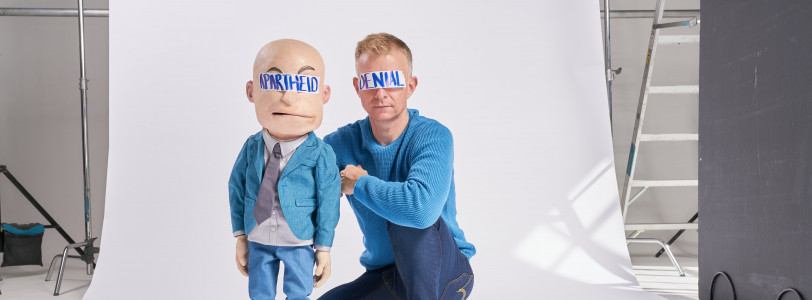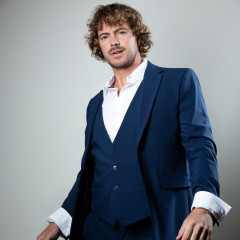Could you first introduce yourself to the reader?
I am a double EMMY nominated South African satirical ventriloquist. I use puppets to talk about race, politics and general silliness. My most famous puppet, Chester Missing, is famous for interviewing politicians on TV in SA and once went to court fighting racism, as weird and nutty as that sounds.
How would you describe your show?
My Edinburgh show, White Noise, is an hour long rollercoaster ride conversation on racism, apartheid and colonialism between myself, a white South African ventriloquist, and my puppet, who doesn’t give a damn about if I get cancelled or not. I want Chester Missing to roast some racists, but he refuses to co-operate until I have dealt with my own racism, and he’s ready to drag all my skeletons out the closet as it happens. From my earliest memories of growing up during apartheid to current prejudices he’s not holding back. And as the two of us have literally gone to court fighting racism it’s quite a story to tell. It’s also just a really fun political ventriloquism show.
Why do you want to perform at Edinburgh Festival Fringe?
The Edinburgh Fringe is the place where you can take work to new levels – the most comedy savvy audiences Earth, with some of the world’s best acts. It’s taken years to make what I do in South Africa translatable to a Western context, and Edinburgh is the perfect place to debut it.
What differentiates it from other festivals?
The size of the festival and the level of the acts mean that you can just do better, and take work further than at many other smaller festivals.
What first motivated you to enter the industry? Who were your inspirations?
I’ve always loved comedy - Eddie Izzard was a huge inspiration, as was for example South African political satirist Pieter-Dirk Uys, and Eddie Murphy back in the day. Ventriloquists like Ronn Lucas and Dave Strassman inspired me too. The comedy industry in South Africa post apartheid had a deeply political tone, which influenced me deeply. Comedy is often a way for kids who don’t fit in to speak back to the cultural status quo.
How has your background, upbringing and education had an impact on your artistic career?
I am a middle class, English speaking, liberal white South African, a poster child for apartheid privilege. I also studied social anthropology as the South African Truth and Reconciliation Commission was happening, and did a further MA in the subject focusing on how people use humour to strategically shape their interests, often along race, class and gender lines. Coming to terms with how racism has shaped my life, and my insider status when it comes to South Africa’s white establishment has been an intense ride, and profoundly shaped my comedy voice. This show is a result of decades of work in this, and pulls together an MA in anthropology with years of literally interviewing politicians, many of whom actively fought apartheid, on TV in one of the world’s most unequal societies.
What is your earliest childhood art memory?
I remember having endless fun with playdough. Now I talk to it for a living!
If you didn’t have your current job, what would you probably be doing?
I’d be an academic studying social anthropology.
Did Covid-19 change the way you create work? Do you approach shows with a different mentality now?
Covid made me more diverse in my work - I wrote an entire politically safe show, because the market I am in needed fun more than it needed hard hitting satire, and I became more assertive about providing my fanbase with great digital content. I also did a lot of Zoom shows. They suck, but I’m really good at them. But really Covid just gave me a chance to make this show I am bringing to Edinburgh even better.
Describe the last year in 5 words or less?
Bungee jumping, hoping you’re attached.
Do you subscribe to the idea that art should be exempt from ‘cancel culture’?
I don’t think anything should be exempt from cancel culture, including the idea of cancel culture itself. The problem is that we use these terms without examining their meaning and intention. I don’t think that art is somehow magically outside of the systems of power and oppression that have left billions of colonised, and others in poverty. The most brutal example is the fact that Jim Crow, after whom the racist laws in the US were named, was himself a comedian, an evil one to be sure. Art and comedy are not to blame for an unjust society, but they are definitely part of the rhetoric by which the status quo maintains its logic.
We believe in our own individualism, but really what we laugh at is a product of socialisation, and that socialisation includes normalising Sudanese refugees being seen as less human than, for example, Ukrainian refugees. Will there be any Ukrainian refugees sent to Rwanda? I doubt it. The problem with cancel culture is twofold. Firstly, cancelling just pushes bigots into their confirmation bias groups, thereby just reinforcing their views. Secondly, when it comes to racism in particular, as a white commentator the moment I assume I am better than some right wing bigot I am effectively scoring points off other people’s pain. As white people we all benefitted from colonialism and slavery at some level. Cancelling, while at times drawing a clear and important line in the sand, is not enough to lessen prejudice and inequality and at times stops us from doing so. Education and political strategising will do more to do that, but that makes for less impressive tweets and follows.
If you could work with anybody, from any point in history, who would you pick and why?
Cecil John Rhodes. He’s the guy who planned black poverty in Southern Africa, and looted the region of its wealth. I would shout obscenities at him, and demand he apologise and pay reparations.
What advice would you give to someone who wants to take a show up to the fringe?
As it’s my first Edinburgh I am no expert, but I know that working on my craft and touring smaller festivals definitely allowed me to up my game before jumping into the deep end. Canada’s festival circuit, for example, is a brilliant asset to any artist building body of work.
When and where can people see your show?
Pleasance Courtyard Bunker 3, 9:45pm, 3 - 29 August.
And where can people find, follow and like you online?
Facebook: @chestermissing, Insta: @MrChesterMissig, TikTok: @chestermissing, Twitter: @chestermissing, YouTube: @ChesterMissing
Conrad Koch’s debut show ‘White Noise’ will be at the Pleasance Courtyard Bunker Three for the month of August for tickets go to www.edfringe.com









0 Comments